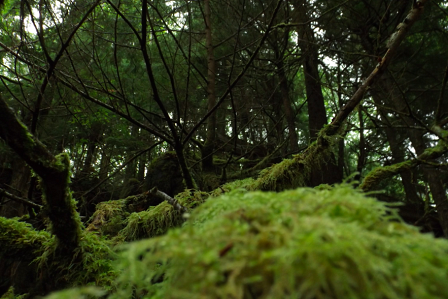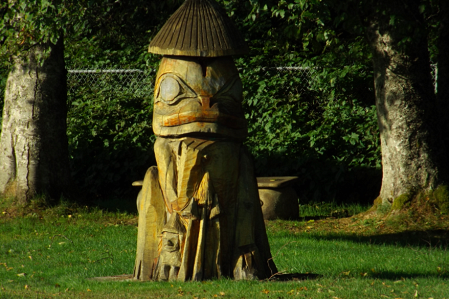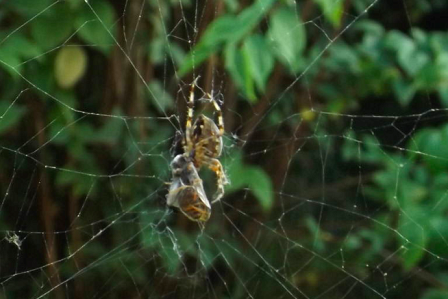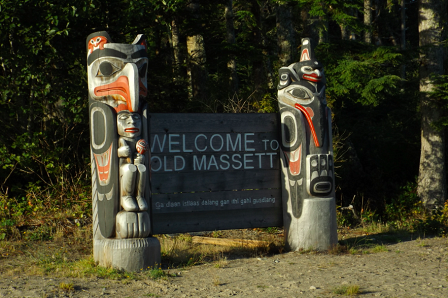Erstellt am: 30. 1. 2016 - 10:30 Uhr
Haida Gwaii: 17,000+ years of Haida Heritage
FM4 Reality Check: Our tour around the archipelago of Haida Gwaii will become available as a podcast and a "Saturday Special" on today´s Reality Check.
Check out my other web story about Haida Gwaii!
Also, special thanks go to Eric Kalnins and the other lovely people at BC Ferries without whose assistance this feature would not exist.

Johnny Bliss, 2013
"A language communicates cultural context, how a people even think. The slow extinction of our language is one thing we all struggle with."
-Natalie Fournier/Jaadguusandlans,
Promotion officer for Gwaii Haanas National Park

Johnny Bliss, 2013
Haida Gwaii (formerly known as the Queen Charlotte Islands) is an island chain on the pacific northwestern coast of Canada, near the border with Alaska. It has been inhabited by the Haida people for the last 17,000 years, but a lot has changed in just the last two hundred.
After decades of epidemics and cultural obliteration, in the form of destructive "residential" re-education schools, this once proud warrior nation now finds its biggest battle is preserving its own wounded culture.
This week’s Reality Check Saturday Special takes a tour of Haida Gwaii (and the Gwaii Haanas National Park), meeting several locals (including a 'watchman' who protects old village sites, and a well-known hermitic Canadian poet named Susan Musgrave) to find out about the culture of the Haida people in the past, the present, and hopefully in the future.

Johnny Bliss, 2013
A Story As Sharp as a Knife
A lot has changed and been lost in the last two hundred years since nearly all of North America got colonized by Europeans, but efforts since then to preserve the culture are ongoing, and not only Haida people are doing it.
In the last hundred years a few anthropologists have come in from outside and attempted to write down some of the oral storytelling traditions.
This is very important, considering that much of their traditions including language were lost largely due to Canada's backwards policy of taking indigenous children away from their families and re-educating them in what were notoriously known as "residential schools".
Back in 1999, an author named Robert Bringhurst went to the trouble of translating a large number of Haida stories and publishing them in a book called "A Story As Sharp As a Knife".

Johnny Bliss, 2013
As important as these stories were, the book remained obscure and was only published in small quantities in the US and Canada... until now. Margaret Atwood, arguably Canada's most well-known and respected author, has successfully lobbied to get the book published in Europe by the boutique publisher, the Folio Society, based in the UK. But how did this book catch Margaret Atwood's attention to begin with? Well, Haida Gwaii is a beautiful, mystical place to visit, and very appealing to authors.
In the far north of the islands, in a place called Masset, I stayed at a guesthouse called the Copper Beech Guesthouse, which is run by a popular Canadian author (and sort of hermit) named Susan Musgrave. The remote location of the guesthouse at the northern tip of this beautiful island chain makes it an appealing retreat for a lot of contemporary authors including William Gibson, Margaret Atwood, and many others. In fact, according to Susan, in the very room where I was sleeping!

Johnny Bliss, 2013
Haida Gwaii and Basketball
Basketball, a sport created by Canadians (but not by First Nations people), is now very popular among coastal pacific northwestern indigenous communities. Every year in early February, the All Native Basketball Tournament is hosted in Prince Rupert, bringing together people young and old from Nations all the way up to Alaska, and down to Vancouver.
This is perhaps the most significant silver lining of the dark cloud that is the legacy of Residential schools. When abducted indigenous children would return to communities, having suffered all of this colonial reprogramming or brainwashing, many of them also brought back the game of basketball, which later would catch on in a big way.
Natalie Fournier, the Haida woman I quoted above, told me the gathering of Nations at the Prince Rupert tournament is not only about the game! She told me rather (and this is a paraphrase, here) that it is a bit like a modern answer to the old potlatch system, where Nations - even and especially warring ones! - would come together to discuss trade and other alliances.
For more stories and knowledge shared by the characters who dot the scenic landscape of Haida Gwaii, tune in at 12 o'clock midday to FM4 Reality Check, or check back here after the program for the podcast!
FM4 Reality Check
If you miss the program, you can still stream it via the Reality Check podcast or at fm4.ORF.at/player.


